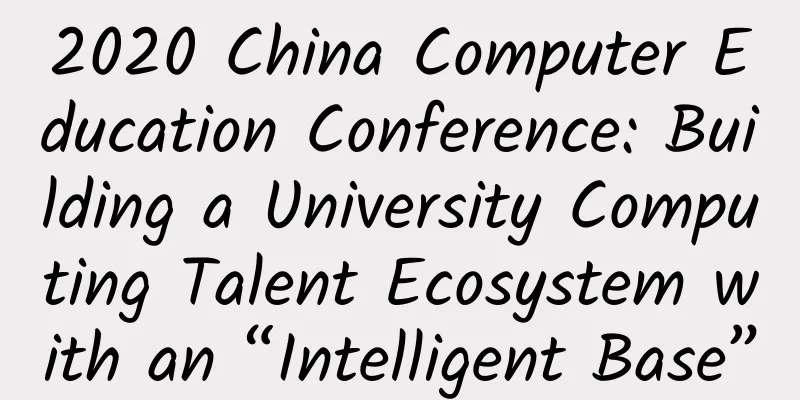2020 China Computer Education Conference: Building a University Computing Talent Ecosystem with an “Intelligent Base”

|
[51CTO.com original article] From December 18 to 20, 2020, the 2020 China Computer Education Conference with the theme of "New Changes, New Technologies, New Opportunities" was grandly held at the Xiamen International Conference Center. Wu Yan, Director of the Department of Higher Education of the Ministry of Education, Turing Award winner John HopCroft, Academician Zhao Qinping, Academician Zhang Yao, Academician Wu Jianping, Academician Gao Wen, Academician Guan Xiaohong, Academician Wang Huaimin, Academician Wushouer·Salamu and many other academicians and university guests shared their wonderful views. More than 100 industry-university-research leaders and more than 3,000 university teachers and students attended the conference to discuss the future development of computer education. On the morning of the 20th, the "Computing System Forum", an important sub-forum of this conference, was also grandly opened. Computing system is a complex and broad research field. With the rapid development of computer hardware and software and network systems, big data, cloud databases, data management, operating systems, processors, computer vision, etc. are all included. To create a teaching system that can help students cultivate systematic thinking and achieve a thorough understanding of the current mainstream hardware and software systems, it is necessary not only to give full play to the experience of well-known universities in teaching reform, but also to rely on the research and development results of top companies in cutting-edge technologies. Well-known academic scholars and enterprises work together to discuss the future of computing Well-known professors from Peking University, Tsinghua University, East China Normal University, Harbin Institute of Technology, Shanghai Jiao Tong University, and Beijing University of Posts and Telecommunications also discussed with Huawei the new opportunities and challenges of computing systems under the new situation, focusing on cutting-edge core technologies of computing systems, the latest research results, teaching practice effects, industry-education integration methods, and future development trends. In his speech, Chen Zhong, professor of the Department of Computer Science and Technology at Peking University and vice chairman of the Higher Education Computer Professional Teaching Guidance Committee of the Ministry of Education, explained the experimental design features of "Introduction to Computing Systems", the main course of the small-class seminar-based teaching reform of the Department of Computer Science at Peking University, and summarized and shared experiences on the practice and application of the complete experimental system introduced from CMU.
Chen Zhong, professor of the Department of Computer Science and Technology at Peking University and vice chairman of the Higher Education Computer Professional Teaching Steering Committee of the Ministry of Education, delivered a speech Zhou Aoying, vice president of East China Normal University, said in "Database Research and Teaching in the Internet Age" that digitalization is essentially data and digital intelligence. Data is the bridge and medium for the interconnection of all things and a new energy source. Data is the fifth major production factor, and the recognition of its importance has reached a new height. Databases are the infrastructure of the information society. History illuminates the future. my country's database research and teaching are facing a rare development opportunity.
Zhou Aoying, Vice President of East China Normal University, delivered a speech Zhang Youhui, professor and doctoral supervisor at the Department of Computer Science at Tsinghua University, summarized several introductory courses on computer systems taught in recent years for undergraduate students in the Department of Computer Science and the School of Software. She introduced how to adjust the teaching content and methods based on the development of computer systems and the characteristics of different teaching objects, so that the courses become an effective starting point for students to correctly understand the entire computer system and a tool for cultivating computer system capabilities. Li Guoliang, tenured professor of the Department of Computer Science at Tsinghua University and deputy director of the Database Committee, discussed some ideas and suggestions for the construction of data courses; Zhan Dechen, second-level professor and doctoral supervisor at Harbin Institute of Technology, combined with the construction of first-class courses, briefly introduced the problems existing in current course construction, the construction ideas of new engineering courses, the construction of open courses, the open degree education system, etc., trying to find some solutions for the teaching reform of new engineering courses in colleges and universities. Dr. Liang Xiaoyao, professor and deputy director of the Department of Computer Science and Engineering at Shanghai Jiao Tong University, and Chang Jianlong, chief researcher at Huawei Cloud, respectively gave comprehensive explanations on "The Practice of Huawei Ascend AI Processors in Undergraduate Teaching Courses" and "The Exploration and Practice of Large Visual Pre-training Models". Dai Zhitao, professor of the School of Computer Science and Technology of Beijing University of Posts and Telecommunications (National Demonstration Software College) and director of the Experimental Teaching Center, delivered a speech on the theme of "Teaching Reform of Computer Architecture Course Group (Huawei Kunpeng) under the Background of New Engineering". Ma Quanyi, Huawei's open source operation expert and technical expert in container technology, DevOps and other fields, delivered a keynote speech on "The Combination of Open Source Operating Systems and University Teaching Practices". The digital age is a new era of computing and artificial intelligence. In this era, Huawei's intelligent base project not only solves the problem of talent supply in the ICT industry, but also accelerates the overall level of computing talents in colleges and universities, helping China to make early arrangements in the new era of intelligent computing. Of course, the prosperity of computer education not only requires leading companies like Huawei, but also depends on the joint efforts of all links of industry, academia and research. Only by building consensus, deepening cooperation and expanding sharing can we provide strong support for cultivating high-end information technology talents with cutting-edge thinking and cooperative spirit, and gradually moving towards the deep integration of Internet +. Zeng Weisheng, Director of the University Research and Talent Development Department of Huawei Cloud and Computing BG, was invited to the scene as the chairman of the sub-forum and delivered a keynote speech entitled "Discussion on Talent Cultivation in the New Computing Industry", discussing how Huawei's intelligent base project empowers talent training in universities. Zeng Weisheng, Director of the University Research and Talent Development Department of Huawei Cloud and Computing BG, delivered a speech A new round of technological revolution is emerging around the world today, and the competition in the "scientific and technological innovation" track is particularly fierce. Under China's new development pattern of "dual circulation", science and technology not only improve the overall efficiency of the country's production system in thousands of industries, but also create a high-quality development momentum and open up new innovation channels. An excellent engine. Obviously, for China to become a world-leading country in scientific and technological innovation, it is far from enough to have a huge consumer market of 1.4 billion people as a material basis. The continuous input of digital talents is also a key link. This is also the official significance of the 2020 China Computer Education Conference, which enables domestic universities to input high-quality and massive talents for domestic industries. Huawei and the Ministry of Education work together to build an "intelligent foundation" to empower the cultivation of digital talents As we all know, computing systems are a complex and broad research field. With the rapid development of computer hardware and software and network systems, computer education in colleges and universities faces a greater impact. For the college education system, it is necessary not only to create a teaching system that integrates mainstream hardware and software systems through education reform, but also to require top companies in the industry to contribute their own research and development results in cutting-edge technologies. For this reason, in order to cultivate the massive computing talents needed in the digital age, Huawei has joined hands with the Ministry of Education to build an "intelligent base" industry-education integration collaborative education base in relevant colleges and universities. Now, in 72 universities including Peking University, Tsinghua University, Shanghai Fudan University, Shanghai Jiaotong University, Xi'an Jiaotong University, and Harbin Institute of Technology, the Kunpeng and Ascend series of courses have been integrated into computer majors, software engineering majors, artificial intelligence majors, and electronic information majors for the first batch of pilots. At present, the "intelligent base" project mainly focuses on the fields of computer, electronic information, artificial intelligence, and software engineering, involving a total of 22 courses. Huawei's four key measures to build a talent ecosystem in universities Huawei has always attached great importance to cooperation with the domestic education industry and continues to expand its investment, because only an industry-driven knowledge system and a talent system that integrates industry and education can truly implement curriculum theory into development practice, empower industry applications, and stimulate the continuous vitality of the industry. Taking Huawei's fertile soil university teaching and research support plan as an example, Huawei helps universities use Huawei Ascend full-stack AI and Kunpeng's technical capabilities and computing resources to carry out university artificial intelligence and Kunpeng-related discipline construction, cultivate new engineering talents required for industrial transformation and innovative development, and develop 3 million university developers in the next five years. Huawei has four key initiatives in the construction of talent training system in colleges and universities: First, it deeply participates in national competitions and activities, such as actively participating in the World MOOC Conference and the "Internet +" University Student Innovation and Entrepreneurship Competition; second, school-enterprise collaborative innovation. In this regard, Huawei insists on investing high-quality resources to promote school-enterprise collaborative innovation around the fields related to Kunpeng and Ascend industries; third, it supports colleges and universities to build a number of bases, such as talent training bases in key core fields and computing industry teacher training bases; fourth, it supports colleges and universities to build course resources, mainly including digital teaching resources that integrate the latest industrial technologies of Kunpeng and Ascend and core courses of the latest industrial technologies. It is understood that Huawei will also release a series of professional textbooks in the future. In fact, cultivating Kunpeng and Ascend talents in colleges and universities is only the first step in Huawei's strategic planning in the new computing era. As an ecological industry, Huawei continues to empower the ecosystem through the three basic areas of Huawei Cloud, Kunpeng, and Ascend. From servers and components, operating systems and virtualization, storage, to databases, middleware, big data, and cloud services, the ultimate goal is to promote a huge industry application market worth hundreds of billions of yuan, allowing thousands of industries to enjoy the dividends of "technological innovation." [51CTO original article, please indicate the original author and source as 51CTO.com when reprinting on partner sites] |
<<: In 2020, who will break out in the 5G era?
>>: Introduce the commonly used encoders and decoders in Netty
Recommend
UL launches Wi-Fi 6E testing service in Europe
UL announced this month that it has begun offerin...
Three-minute review! A quick overview of 5G industry development trends in December 2021
After the rapid development in 2020, 2021 is a cr...
Is your phone WLAN or WiFi? What is the relationship between the two?
I wonder if you have noticed the names of wireles...
How to share WiFi gracefully when the password is hard to reveal
"What's your home WiFi password?" T...
Transforming the network to support remote work as a norm
Before the COVID-19 pandemic, remote work was mor...
F5: How does edge computing change the digital banking experience?
[[408931]] A report jointly released by IDC and B...
How can operators make full use of SDN?
When talking to communications service providers ...
Why the popular dual-band wireless router advantages tell you
Open the e-commerce website, dual-band wireless r...
Review of 2020丨Digital economy development has burst into surging momentum
Not long ago, the Fifth Plenary Session of the 19...
Interpreting the four major reasons why my country is comprehensively promoting the implementation of IPv6!
In November 2017, the General Office of the CPC C...
The arrival of 5G will trigger a larger-scale patent war, and the market size is expected to grow 120 times
Automakers are battling in court with Qualcomm, N...
V.PS: €9.95/year VPS with new German data center, 1G memory/15G SSD/1TB monthly traffic
The Nano series provided by V.PS adds a German da...
With the advent of the 5G era, there will be three major changes in the future, and the retail industry will be the biggest beneficiary
The arrival of the 5G era not only brings develop...
Is intelligent virtualization technology eliminating data silos?
In the ever-changing information age, companies t...









